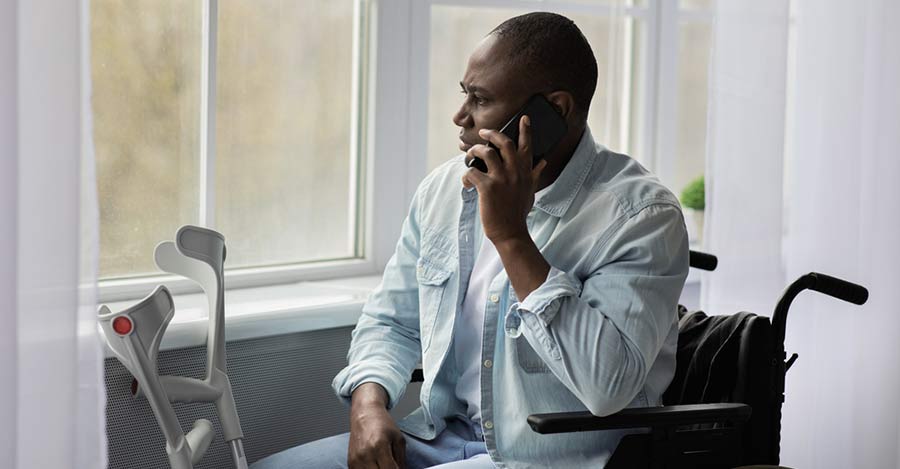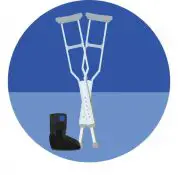12 Ways to Stay Positive While Recovering on Crutches
- Last Update:
A close relationship exists between physical injury and mental health. This reality is supported by research, which concludes that a severe injury can trigger mental problems like depression, anxiety, and post-traumatic stress disorder (PTSD). Such a conclusion indicates that recovery from a severe injury is not just a physical process but also a mental one.
If your injury has left you in crutches and you are struggling mentally, this article is for you. We focus on ways to stay positive and take care of your mental health while recovering. Before exploring different methods of dealing with anxiety and depression during recovery, we look at how a physical injury affects mental health.
Effects of Physical Injury on Mental Health

In an article about how being injured affects mental health, the National Collegiate Athletic Association (NCAA) suggests that “the psychological response to injury can trigger or unmask serious mental health issues such as depression, anxiety, disordered eating, and substance use or abuse.”
The NCAA describes itself as “a member-led organization dedicated to the well-being and lifelong success of college athletes.”
Some of the emotional responses listed by the NCAA include:
- Sadness
- Isolation
- Irritation
- Lack of motivation
- Anger
- Frustration
- Changes in appetite
- Sleep disturbance
- Disengagement
Generally, any mental issues triggered by an injury will subside over time. However, sometimes the challenges linger for extended periods, leaving the affected individual with post-traumatic stress disorder (PTSD).
The not‐for‐profit provider of healthcare services and information, MayoClinic.org, defines PTSD as “a mental health condition that’s triggered by a terrifying event — either experiencing it or witnessing it.” The same source adds that “Symptoms may include flashbacks, nightmares and severe anxiety, as well as uncontrollable thoughts about the event.”
Dealing with Mental Health Problems During Recovery
The idea that the way people react to trauma depends on several factors, including the kind of injury experienced, its severity, the kind of support available, personality traits, the existence of other stressors in the injured individual’s life, and whether the person has experienced trauma before, is supported by the Better Health Channel. Better Health Channel is an Australian provider of health and medical information.
The Better Health Channel perspective suggests that there can never be a one-size-fits-all solution to dealing with mental health issues while recovering from an injury. However, some common techniques for staying positive during recovery are suggested by several credible sources. We look at some of them below.
1. Accept the Situation
Bobbi Emel wrote an article published by the resource for peace and happiness TinyBuddha.com entitled How Accepting Your Pain Can Help You Heal.
To drive her point home, Emel quotes Eckhart Tolle, who says, “Whatever the present moment contains, accept it as if you had chosen it. Always work with it, not against it.” She adds, “Resistance does not help you; it only saps your energy.”
The idea that resistance delays healing is supported by Dr. Karyn Hall, a certified clinician, and author. She suggests that “It’s exhausting to fight reality, and it doesn’t work.” She adds that attempting to resist or avoid the situation you’re facing only adds more suffering to the pain.
When you accept the injury and the fact that you will spend some time on crutches, you are opening the way for dealing with the situation. You can only deal with a situation that you have accepted.
Hall proposes that you can transform your resistance feelings into accepting beliefs like “I’m in this situation. I don’t approve of it. I don’t think it’s OK, but it is what it is, and I can’t change that it happened.”
2. Practice Positive Self-Talk
Fundamentally, it’s not what people say to you that matters most when recovering from an injury. Instead, the most crucial factor is the inner monologue, called self-talk, that you have with yourself when everybody else is not around.
When you hold reaffirming thoughts, you start to understand that the power over your feelings lies within you and not in what someone else thinks or says.
The American Psychiatric Association advises that as part of this positive self-talk, you need to “Remind yourself and others that it’s normal to have many different feelings as well as ‘good days’ and ‘bad days’ as a natural part of recovery.”
3. Live in the Moment with Mindfulness
Several studies accept the idea that practicing mindfulness has benefits for the healing process. This is a view supported by an article published by the UCLA Mindful Awareness Research Center.
The UCLA article says that mindfulness research “has identified a wide range of benefits in different areas of psychological health, such as helping to decrease anxiety, depression, rumination, and emotional reactivity.” Adding, “Research has also shown mindfulness helps to increase well-being, positive affect, and concentration.”
Writing for the website that provides content on mental health topics, VerywellMind.com, Cathy Wong defines mindfulness meditation. She calls it an exercise that combines mindfulness and meditation, teaching you “to slow down racing thoughts, let go of negativity, and calm both your mind and body.”
4. Do Not Isolate

When you have just been injured, it’s expected that you may feel afraid or unsafe in certain situations. At such a time, it’s vital that you remain among people you can depend on as much as possible.
The American Psychiatric Association advises injured individuals to “Stay connected with friends, family, neighbors, and colleagues to give and receive support.” Adding that “Helping one another aids in healing.”
5. Keep a Journal
What a Physical Injury Taught Me About My Mental Health is the title of an article written by Scott Muska and published by NBCnews.com. In that article, Scott quotes psychotherapist Shrein Bahrami who says, “Writing or journaling your thoughts and feelings is a great way to connect to the emotions and literally get them out.”
Bahrami adds that journaling can assist you in not feeling overwhelmed by your thoughts and feelings, allowing you to be more objective when perceiving the situation and determining solutions.
6. Take Care of Your Health

When you are trying to recover from an injury that leaves you in crutches, you certainly want to take care of your health. An injury coupled with other ailments can be stressful and make things look worse than they really are.
Some of the elements you need to be mindful of to remain healthy during an injury include:
- Ensuring that you have adequate sleep.
- Managing what you eat carefully so that you consume a balanced diet that will aid healing.
- Avoiding drugs and alcohol.
- Avoiding stressful encounters.
- Drinking enough water.
- Practicing personal hygiene and washing your hands properly.
- Staying active.
7. Listen to Music
It’s official, listening to music is good for your mood and health. An article published by the Florida National University reports that “music is so powerful to the body that it can actually help ease the pain.” The article adds that “Studies show that music can meaningfully reduce the perceived intensity of pain.”
8. Keep Moving
An injury that leaves you in crutches will likely slow you down, leaving you moving less than you would otherwise do without the injury. This is a view also acknowledged by HelpGuide.org, a non-profit provider of mental health and wellness information. HelpGuide.org suggests that “Trauma disrupts your body’s natural equilibrium, freezing you in a state of hyperarousal and fear.”
Healthline.com mentions that “There are ways to improve circulation in your legs, no matter what your level of activity — even if you’re lying in bed.” We look at the specific exercises you can do while sleeping, sitting, or standing later in this article.
In the beginning, as you get used to your crutches, it may not be easy to move, but the idea is to do whatever movement you can. However, before you do any movement, you need to get the go-ahead from your doctor.
9. Exercise and Stay in Shape
One of the benefits of exercise is that it can make people feel better about themselves. This view is supported by three medical doctors, Ashish Sharma, Vishal Madaan, and Frederick Petty. In their article published by the Journal of Clinical Psychiatry, the authors note that “Aerobic exercises, including jogging, swimming, cycling, walking, gardening, and dancing, have been proved to reduce anxiety and depression.”
It is, however, crucial to note that exercise is not always straightforward when you are on crutches, but this doesn’t mean that it’s impossible. The most important thing is to ensure that you do not put much pressure on your injured leg. It’s also important to target the areas that are not injured when you exercise.
In his article published by USNews.com, Ruben Castaneda suggests some exercises you can do to remain fit while you recover:
Exercise sitting or lying down: You can lift weights targeting the upper body while sitting or lying down.
Use resistance bands: Ask your physical therapist to recommend resistance bands you can use, whether sitting, standing on crutches, or lying down.
Exercise the legs: An example of exercises you can do when sitting include straightening the leg and keeping it in the air for several seconds. This helps prevent muscle atrophy (the wasting away of muscle because it is not being used) and maintains muscle tone.
Stretch: Gentle stretching before and after every exercise will help you maintain flexibility.
You can do these types of exercises several times a day.
It’s important to get the go-ahead of your doctor or therapist before you start exercising. The University of Michigan Health suggests that you should “Start each exercise slowly and use your pain level to guide you in doing these exercises.” The same source adds that when you feel more than mild pain, ease off.
10. Ease the Pain Caused by Crutches
Sometimes the distress during recovery comes from crutches; hence you need to find ways of easing this pain. Here are some tips to help you feel less pain when recovering on crutches:
- Learn to use your crutches correctly.
- Get the right crutches for your situation, and if you have already bought the wrong pair, you will be better off if you get rid of it and buy a proper one.
- If you can afford it, buy the best crutches with adequate cushioning.
- Ensure that the pain is not coming from the shoes you are wearing; you need to change the shoes if it is.
- Keep exercising so that you are fit enough to walk around on crutches without pain.
- Ensure that your crutches are correctly adjusted.
11. Ease the Pain Caused by Crutches
If you have tried some of the suggestions above and the symptoms continue to the extent that you feel debilitated, it may be time to seek professional help.
The Anxiety & Depression Association of America lists some resources you can contact when battling with PTSD:
12. See the Silver Lining

While no one wants to experience trauma, if it has already happened to you, you can use the experience to learn vital lessons and focus on yourself.
BeaconJournal.com, a part of the USA Today Network, quotes Caroline Jordan, who runs a website that uplights the sidelined. Jordan says, “An injury allows you to learn more about you.” Adding, “It provides an opportunity to learn how to be more self-compassionate. It also provides time to reflect on things that may need to change in your life.”
